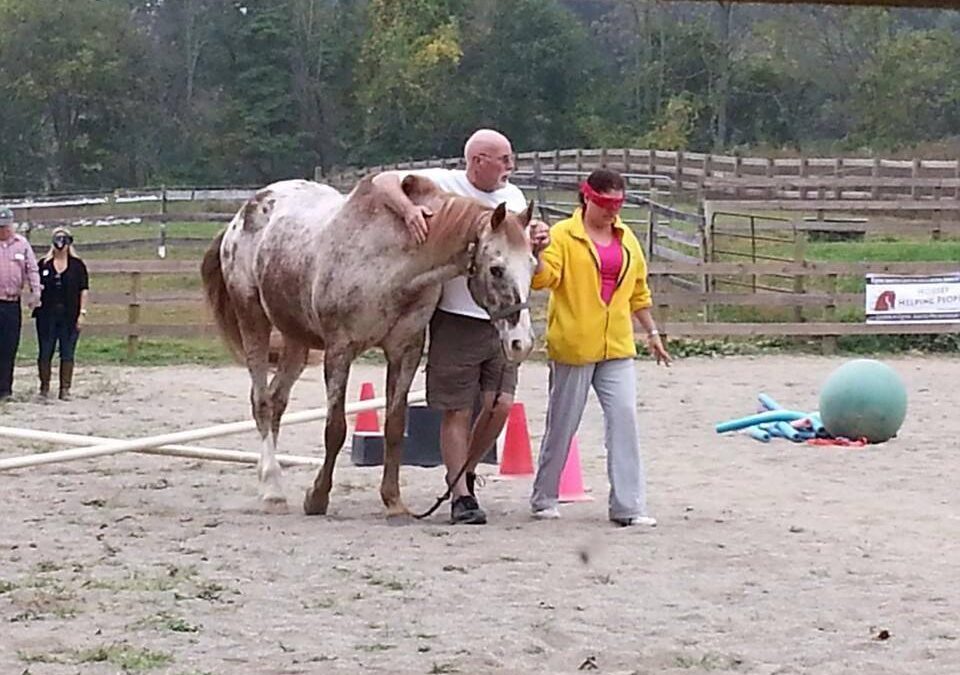By Nancy Jaffer
March 13, 2008
Spring Thaw may have started out as a troublemaker, but the Appaloosa gelding went on to be a long-serving guide and inspiration for those seeking help.
Until his death in January, shortly before his 31st birthday, he was the herd leader at Spring Reins of Life (SROL), which provides therapy through its horses to veterans with PTSD and others in need, such as bereaved children or at-risk teens.
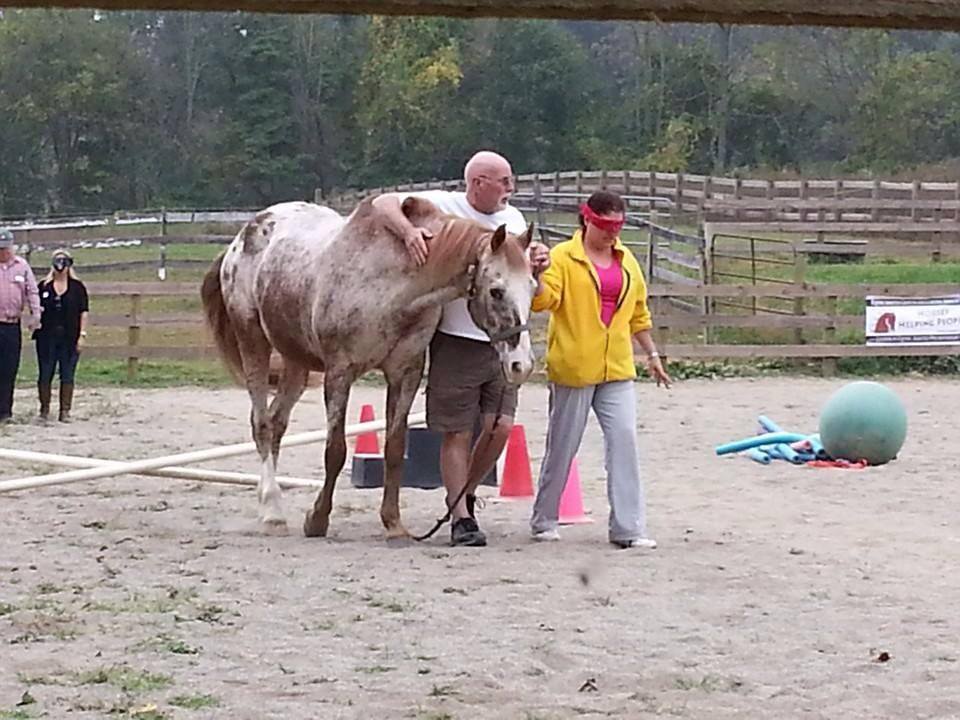
Spring Thaw specialized in helping veterans or others in need.
On March 20, Spring will be one of 15 animals nationwide—and the only one in New Jersey–to be awarded the Planetree Service Animal Medal of Honor 2017. It is being presented by the New Jersey Veterans Administration Healthcare System and the Veterans of New Jersey.
The public is invited to attend the 10:30 a.m. ceremony at Hunt Cap Farm, 401 Main St. in the Three Bridges section of Readington, where SROL is based. Fittingly, it will be the first day of Spring.
As a rental horse for Manhattan’s old Claremont Riding Academy in 1996, Spring Thaw proved after six months on the job to be too much of a challenge. The last straw was the time he dumped his rider in Central Park, convinced another horse on the trail ride to do the same and wound up scampering through the streets of the city before he and his pal made their way back to the stable. It became the subject of a TV news report, prompting the stable’s owner to decide it was time for Spring to go.
Christiana “CC” Capra had been working at the stable as a groom and spent time exploring the city aboard Spring before his final transgression. She stepped up to take the horse and enjoyed eventing with him at novice level until he got Lyme disease.
He was treated holistically by Dr. Judith Shoemaker, a Pennsylvania veterinarian who specializes in complementary medicine and holistic therapy. She introduced CC to the concept of EAGALA, and that was a life-changer both for Spring and his owner.
Explaining the Equine-Assisted Growth and Learning Association precepts, CC noted, “All the work is done on the ground.” The basis is working on emotional and mental health.
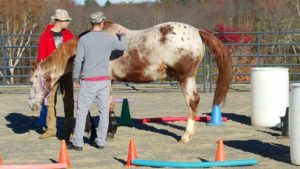
Veterans working with Spring T.haw
“The idea is that when you’re on the horse, it’s a different skill set and you’re more in control of the horse’s body. When you’re on the ground, all bets are off and you’re on equal footing. The horses are able to act out and interact, sort of a barometer of the internal language that’s going on from the client.”
SROL works with trauma survivors in a group.
“Most of the war vets, whether it’s Iraq, Afghanistan or Vietnam, don’t want to talk about their PTSD, the war or where they’re at with that,” said CC.
“With the horses, we don’t have to talk; we just sort of `be’ and `experience.’ We set up scenarios; we ask clients to build something with props from the arena; we have some things that are combat-related, like flags and plastic guns and things like that they can reference if they want. It becomes a metaphorical exploration of where they’re at,” she continued.
The situation enables them to focus in the moment.
“It’s hard not to be present when you have four 1,000-pound creatures wandering around,” CC observed.
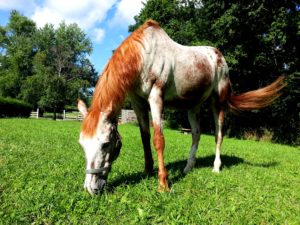
Spring Thaw taking a break from his job.
“We also work on establishing trust and confidence, the ability to be able to explore things and not worry about whether you’re doing it right or wrong. We’re not teaching horsemanship. We’re teaching how to handle life.”
She pointed out that the horses display what’s going on, either for a member in the group or the whole group themselves.
“We’re able to ask the clients, `What do you think is happening with the horses right now?’ Through their interpretation of what they see in the horses, it usually comes out pretty honest about their understanding of what the horses are doing and how they’re acting. Then later, they’re able to reflect and see how that may be how they are themselves.
“Trying something different with their horse, in their approach to gather the horse or get close to the horse, becomes metaphors for them in their own lives of what they can do with their marriage or home life or depression, or whatever may be going on. We don’t need to know what their story is, as long as they know and can relate to what the horses are showing them.”
CC said Spring was a mastermind, realizing just what he was doing with clients and his herd, exhibiting a sixth sense that linked him to the people participating.
She recalled an instance with an at-risk youth group that was part of a gang prevention program.
“One kid looked back at me and said, `Is this horse some kind of Jedi horse?’ noting how Spring anticipated what he was doing.
“After a while, he started to reference that kid, and I thought, `Maybe he is a Jedi horse,’ ” CC chuckled.
“He was an emotional surgeon. He just went right to it. It is our honor to keep this legacy alive. Spring Thaw gave all he had into our arena and he dedicated the last 10 years of his life to this mission.
“One of the last things I said to him before his great heart stopped was `I promise my boy, Jedi horse, we will make you proud of us.’ He was my confidant, my rock, my guide, my lifetime horse for the last 21 years.”
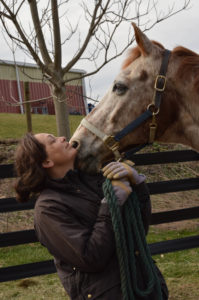
CC and Spring Thaw communing.
The Open Group under Operation Horse, linked with the Lyons campus of the Veterans Administration New Jersey Health Care System in Basking Ridge, is available to any combat veteran with PTSD.
“We have seen some incredible success with the fact that repeated and longer-term exposure and reflection is creating solutions for these veterans,” said CC.
It was the veterans who nominated Spring for the Planetree award, which speaks volumes about the horse’s impact.
After coming into the program in November 2016, a retired 1SG (first sergeant) named Angel (last name withheld) who served in Iraq, was particularly fond of Spring and nicknamed him “Grandpa.”
He noted that Spring could build confidence in people, most of whom had no experience with horses, citing the case of a petite female client in her late 50s.
“She was terrified of horses,” Angel recalled, but when she went up to Spring and started petting him as he stood quietly, she relaxed immediately.
“He makes you feel comfortable,” Angel said about Spring.
Angel, who called Operation Horse “a great program,” noted the connection that develops between the equines and the participants.
As a veteran, he said, “it’s hard to take the wall down, the barriers; these horses kind of do it for us. You can’t lie to the horse. The horse can sense if you’re tense and will go away from you.”
He had the chance through a contact to ride a horse at another farm and understood because of his background with the program, “It’s a privilege for that horse to let me get on his back.”
Angel recalled that when he came back from his second tour in Iraq, there was a chaplain standing by in the airport who said, “ `I’m going to shake every soldier’s hand who comes off the airplane.’ That’s kind of like Grandpa—how many veterans have touched him, and how many has he touched. It’s amazing, the things that he’s done without even realizing.”
Jennifer Snell, a recreation therapist out of the Lyons facility, noted that Spring had arthritis and had to wear special shoes.
“It was kind of interesting, because a lot of the veterans have physical limitations too, so they could relate to him when he was getting out of his stall, taking his time starting to move. The veterans also could definitely relate to him as the old man, the head of the herd.”
She cited “amazing results” with the program, “how the horses end up mirroring a lot of the things that happen. We have veterans do different things with the horses, like obstacle courses. Building trust is one of the things we work on. They develop a form of trust with the horses and the horses trust the veterans.”
Like Angel, she emphasized the importance of “being able to connect with something.” Breathing exercises, “a relaxation, calming thing” the veterans do with their arms over the horses’ backs and being belly to belly, breathing together, “is a cool thing to see. Grooming also is calming for the veterans, who like making the horses feel better because they’re getting groomed.”
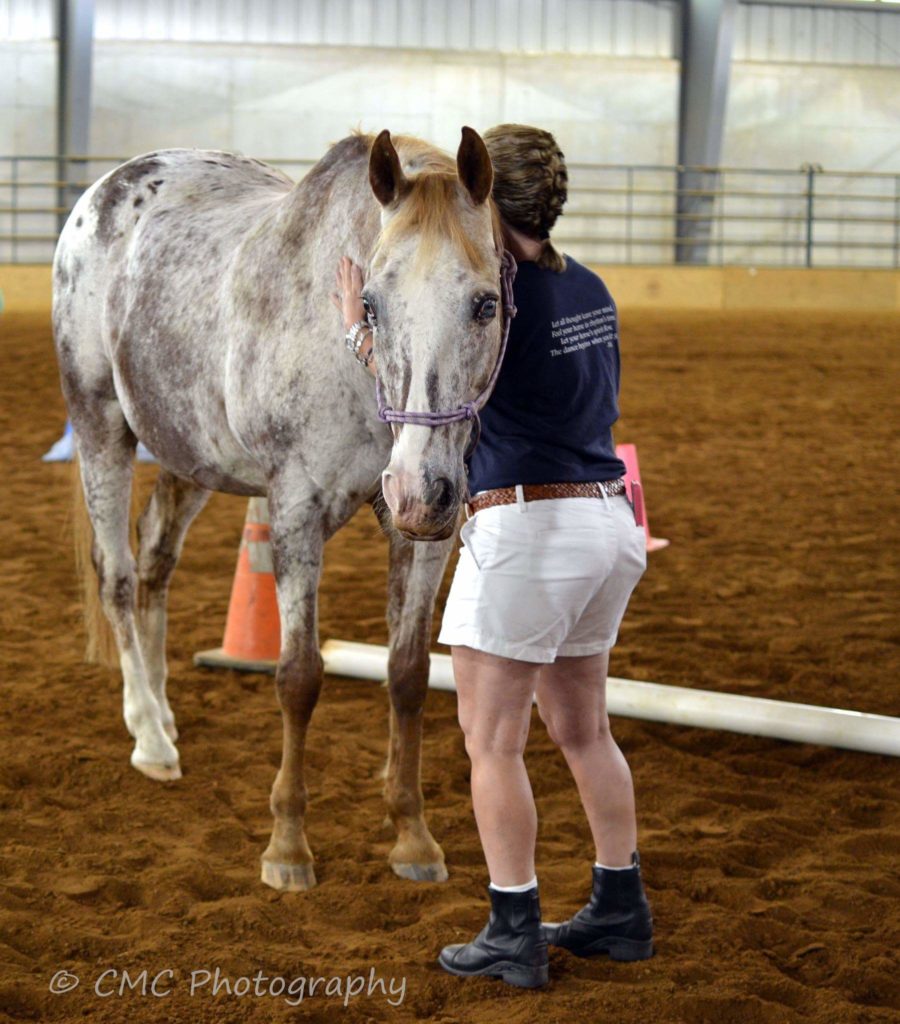
Spring Thaw working on healing. (Photo by CMC Photography)
Finding the money to keep SROL going is always a challenge, but CC has vowed in memory of Spring Thaw to “keep this program funded and saving lives.”
Those wishing to learn more about donating to this 501c3 charitable organization can go to www.springreinsoflife.org .

